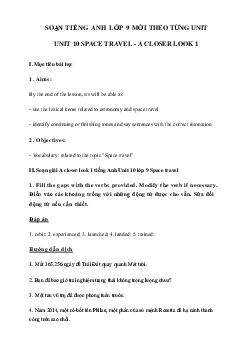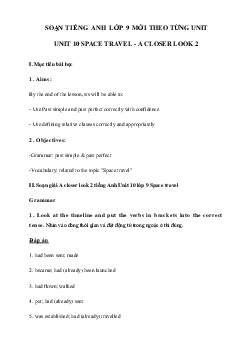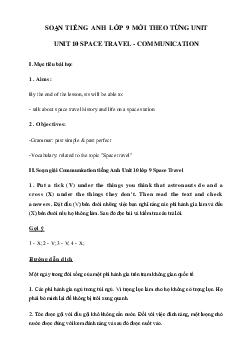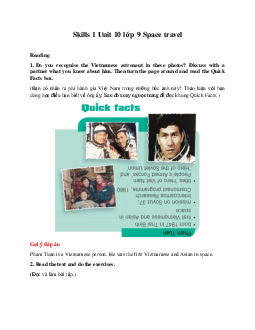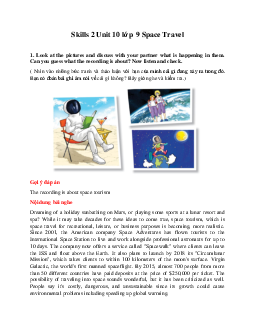


Preview text:
UNIT 10: SPACE TRAVEL I. VOCABULARY Từ mới Phiên âm Định nghĩa 1. altitude (n) /ˈæltɪtjuːd/
:độ cao so với mực nước biển 2. astronaut (n) /ˈæstrənɔːt/ : phi hành gia 3. astronomy (n) /əˈstrɒnəmi/ : thiên văn học 4. attach (v) /əˈtætʃ/ : buộc, gài 5. comet (n) /ˈkɒmɪt/ : sao chổi 6. constellation (n) /ˌkɒnstəˈleɪʃn/ : chòm sao 7. descend (v) /dɪˈsend/ : dốc xuống 8. discovery (n) /dɪˈskʌvəri/ : sự khám phá 9. float (v) /fləʊt/ : trôi (trong không gian) 10. habitable (adj) /ˈhæbɪtəbl/
: có đủ điều kiện cho sự sống 11. International Space /ˌɪntəˈnæʃnəl
speɪs : Trạm vũ trụ quốc tế ISS Station (ISS) (n) ˈsteɪʃn/ 12. impressive (adj) /ɪmˈpresɪv/
: gây ấn tượng sâu sắc 13. galaxy (n) /ˈɡæləksi/ : thiên hà 14. land (v) /lænd/ : hạ cánh 15. launch (v, n) /lɔːntʃ/ : phóng 16. meteorite (n) /ˈmiːtiəraɪt/ : thiên thạch 17. maintenance (n) /ˈmeɪntənəns/ : sự bảo dưỡng 18. mission (n) /ˈmɪʃn/ : chuyến đi, nhiệm vụ 19. operate (v) /ˈɒpəreɪt/ : vận hành 20. orbit (v, n) /ˈɔːbɪt/
: xoay quanh, đi theo quỹ đạo 21. parabolic flight (n) /ˌpærəˈbɒlɪk flaɪt/
: chuyến bay tạo môi trường không trọng lực 22. rocket (n) /ˈrɒkɪt/ : tên lửa 23. rinseless (adj) /rɪnsles/ : không cần xả nước 24. roller coaster (n)
/ˈrəʊlə(r) ˈkəʊstə(r)/ : tàu lượn siêu tốc 25. satellite (n) /ˈsætəlaɪt/ : vệ tinh 26. scuba diving (n) /ˈskuːbə daɪvɪŋ/ : lặn có bình nén khí 27. space tourism (n) /speɪs ˈtʊərɪzəm/ : ngành du lịch vũ trụ 28. spacecraft (n) /ˈspeɪskrɑːft/ : tàu vũ trụ 29. spaceline (n) /ˈspeɪslaɪn/
: hãng hàng không vũ trụ 30. spacesuit (n) /ˈspeɪssuːt/
: trang phục du hành vũ trụ 31. spacewalk (n) /ˈspeɪswɔːk/
: chuyến đi bộ trong không gian 32. solar system (n) /ˈsəʊlə sɪstəm/ : hệ Mặt trời 33. telescope (n) /ˈtelɪskəʊp/ : kính thiên văn 34. universe (n) /ˈjuːnɪvɜːs/ : vũ trụ 35. zero gravity (n) /ˈzɪərəʊ ˈɡrævəti/
: tình trạng không trọng lực
II. Bài tập vận dụng
The word in brackets at the end of each of the following sentences can be used
to form a word that fits suitably in the blank.
1. On the ISS, ____________ have to attach themselves so they don’t float around. (astronomy)
2. It is cheaper to build an unmanned ____________ than the one that is manned. (space)
3. In 2015 NASA discovered an Earth-like planet which might be ____________
because it has ‘just the right’ conditions to support liquid water and possibly even life. (habitat)
4. One of the largest _____________ found on Earth is the Hoba from southwest
Africa, which weighs about 54,000 kg. (meteoric)
5. Experiencing microgravity on a _____________ flight is part of astronaut training programmes. (parabolize) Đáp án
1. On the ISS, _____astronauts_______ have to attach themselves so they don’t float around. (astronomy)
2. It is cheaper to build an unmanned ______spacecraft______ than the one that is manned. (space)
3. In 2015 NASA discovered an Earth-like planet which might be
_____habitable_______ because it has ‘just the right’ conditions to support liquid
water and possibly even life. (habitat)
4. One of the largest ______meteorites_______ found on Earth is the Hoba from
southwest Africa, which weighs about 54,000 kg. (meteoric)
5. Experiencing microgravity on a _______parabolic______ flight is part of
astronaut training programmes. (parabolize)
